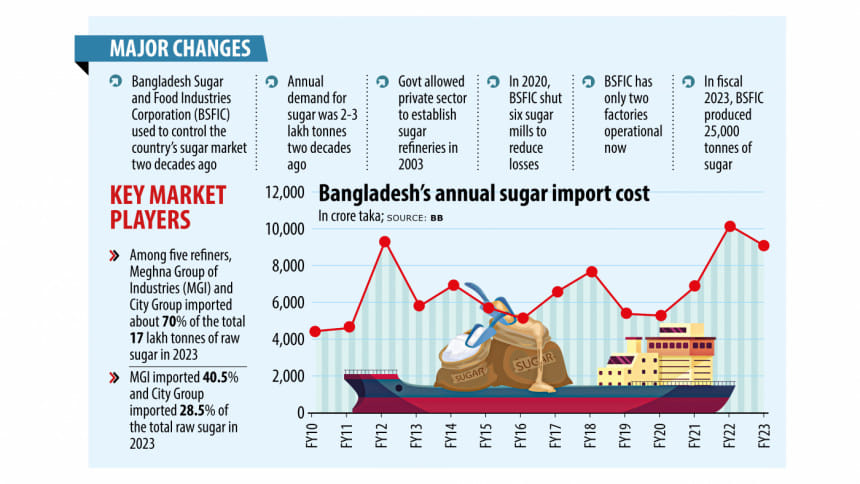Sugar market: from state to private control

Although the sugar industry in Bangladesh was dominated by some 15 state-run mills about two decades ago, it is now largely controlled by just five private enterprises.
Even then, just two of these five business groups, namely the Meghna Group of Industries (MGI) and City Group, accounted for roughly 70 percent of the 17 lakh tonnes of raw sugar imported in 2023.
MGI imported a majority 40.5 percent while City Group imported 28.5 percent of the raw sugar, according to data of the Chattogram customs house.
The third-largest importer of the sweetener was S Alam Group, which catered to about a fifth of the country's demand for sugar in 2023.
The other two private enterprises -- Abdul Monem Ltd and Deshbandhu Sugar Mills -- accounted for the remaining raw sugar imported that year.
Now, these five companies are enjoying an oligopoly in the sugar market, which was worth more than Tk 9,000 crore in fiscal year 2022-23, as they have expanded their refining capacities to meet increasing demand.
On the other hand, the Bangladesh Sugar and Food Industries Corporations (BSFIC), which manages all state-run sugar mills in the country, gradually reduced production across its facilities.
This was mainly due to the ongoing decline of domestic sugarcane cultivation, raising concerns among many that the increased dominance of import-reliant private firms could be detrimental to consumer interests.
At present, five private sugar mills cater to more than 98 percent of the country's 20 lakh tonne annual requirement for refined sugar, with the raw sugar mostly sourced from Brazil.
Market insiders say the government lost its monopoly on the sugar market after allowing private sector enterprises to establish their own refineries in 2003.
Before that, refineries under the BSFIC would collect raw sugar from certified plantations before distributing the refined sugar through its dealers across the country.
"At the time, annual demand for sugar stood at around just two or three lakh tonnes. So, it was easy for the BSFIC to cater to the market and keep it stable," said Abul Hashem, president of the Bangladesh Sugar Merchants Association.
However, the government was eventually forced to allow private companies to enter the market to meet increasing demand amid shrinking sugarcane cultivation.
"Later, the entire market gradually went into the hands of five companies," said Hashem, who has been engaged in the sugar trade for the past three decades.
City Group, one of the country's largest commodity importers and processors, started its sugar refining operations in 2006. Now, the company has a daily production capacity of around 5,000 tonnes.
MGI had started refining sugar that same year through its concern United Sugar Mills, which initially began with a daily production capacity of around 900 tonnes. It is now 5,000 tonnes.
Officials of both Meghna Group and City Group informed that they gradually increased their production capacities and control over the market, with the two enjoying a combined 34 percent share of the market in 2018.
Their dominance only expanded in subsequent years as production at state-run mills continued to fall.
Production at state-run mills declined to 25,000 tonnes in fiscal year 2022-23, down by 87.5 percent compared to 2 lakh tonnes in 2001-02, as per data of the Bangladesh Economic Review.
Additionally, the BSFIC shut six of its sugar mills in 2020 in a bid to reduce losses.
A top official of a private refinery said the lack of land for sugarcane cultivation was one of the main reasons for declining production at state-run mills.
Although the private sector's entry to the sugar market has contributed to ensuring a stable supply of the sweetener, there is a risk regarding import-dependence.
At present, local refiners mainly import raw sugar from Brazil as India has banned shipments.
"This single country dependence makes the industry vulnerable to price volatility," said Taslim Shahriar, deputy general manager of MGI.
"Companies with diversified businesses can absorb shocks. But it would not be sustainable if any company refines and sells sugar alone," he added.
Ghulam Rahman, president of the Consumers Association of Bangladesh, said it is unfortunate for Bangladesh that only a small number of firms control the market for most products.
"Here, one solution could be expanding the market operations of state agencies but there is risk of corruption and sluggishness in the decision-making process," he added.

 For all latest news, follow The Daily Star's Google News channel.
For all latest news, follow The Daily Star's Google News channel. 




Comments